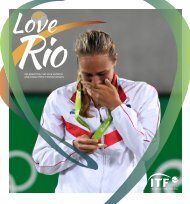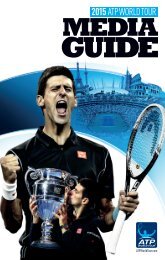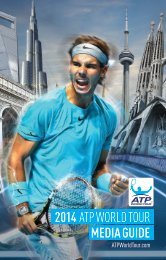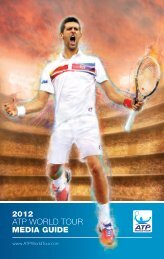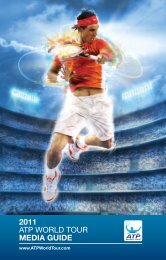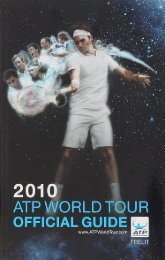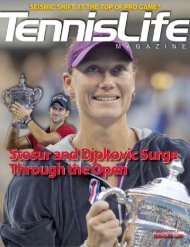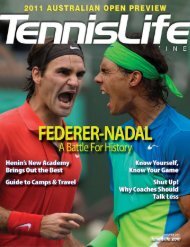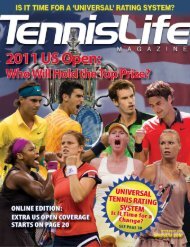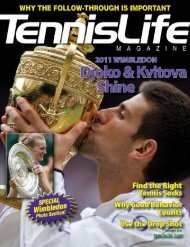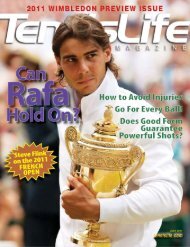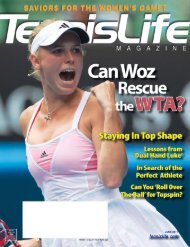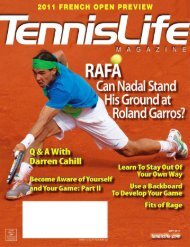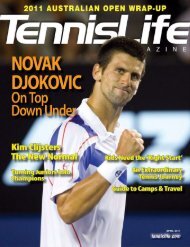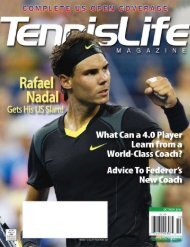A Champion's Mind - Pete Sampras
www.tennismoscow.me Insta:TENNISMOSCOW
www.tennismoscow.me Insta:TENNISMOSCOW
You also want an ePaper? Increase the reach of your titles
YUMPU automatically turns print PDFs into web optimized ePapers that Google loves.
the people there laughed—somewhat nervously. The incident is better forgotten.<br />
There is no one way to greatness, I’ve always realized that. Take my rival in history, Roger Federer.<br />
He went sixteen Grand Slams without reaching a quarterfinal, a mind-blowing statistic given what he has<br />
since accomplished. But in my case, I shudder to think what it might have meant for my future to lose that<br />
match to Jim. It was the final piece of my champion’s puzzle. I had come to grips with the Gift, and had<br />
learned to deal with the expectations and challenges created by having it. In Tim Gullikson, I had a coach<br />
who truly understood my game and personality, who knew what I needed, and could be a friend. He had<br />
been holding his breath, hoping I could close out my inner battle. Did I really want to be a champion? Did<br />
I really have a champion’s heart, and mind, and will?<br />
After Wimbledon, Tim exhaled.<br />
My tennis mission was redefined by that Wimbledon title. The new mandate called for me to win a<br />
boatload of matches to prove I was a dominant champion. The challenge would be staying in close touch<br />
with the Gift. I would lose plenty of tennis matches in the future, I knew that. How could you not, playing<br />
one-hundred-plus matches a year against a staggering array of individuals and styles of game?<br />
I would lose matches for a variety of reasons, including injury, low energy, poor execution—and the<br />
most acceptable of reasons, because I just got my butt kicked by a guy who did everything better on a<br />
given day. Sometimes a very big day. It happens, but trust me—that’s the least of your worries. I learned<br />
early in life how to lose matches, but in 1993 I finally learned how to win matches when I was tired, or<br />
discouraged and tempted to call it a day and move on. Once I learned how to tap into my pride and inner<br />
reserves of determination, I felt much more comfortable being the guy with the bull’s-eye on his back. I<br />
was getting over the typical insecurities of youth, and feeling focused and ready to lay claim to every<br />
Grand Slam title that came my way. It looked like clear sailing, too, but things rarely work out exactly as<br />
you expect.<br />
After Wimbledon, I lost in four straight tournaments on my surface of choice, outdoor hard courts. But I<br />
went deep in three of those events (Los Angeles, Cincinnati, and Indianapolis). I made two semis and a<br />
quarterfinal, and I lost to a Grand Slam champion (or future Grand Slam champion) each of those times<br />
(Richard Krajicek, Stefan Edberg, and Patrick Rafter, respectively).<br />
I felt fine going into the U.S. Open, and it was one of those years when the draw simply opens up like<br />
the vault of a bank, leaving the gold there for the taking. The toughest guy I faced during the Open was<br />
Michael Chang in the quarters, and by then I had too much game for my childhood rival. I simply<br />
overpowered him, playing out the most basic story line in men’s tennis.<br />
I faced a surprise finalist at Flushing Meadows, the Frenchman Cédric Pioline. This was a guy with a<br />
tricky game; he was a good mover, and he had a stroking repertoire that he used to good effect to keep<br />
opponents guessing. But it was also his first Grand Slam final, and that’s a pretty daunting assignment for<br />
a guy well along in his career, unaccustomed to the thin air at the peak of the game.<br />
One of the curveballs thrown at guys who get one or two chances at the golden ring of a Grand Slam<br />
title is the conditions that greet you on the big day. Nobody daydreams about playing a Grand Slam final<br />
under difficult conditions that make it tough to play your best or most attractive tennis. In the finals of your<br />
dreams, the sun is shining, the air is still, the crowd is poised and hanging on every forehand and<br />
backhand with ooohs and aaahs.<br />
But it rarely works out that way. It was windy on the day of the Open final—it seems like it was always<br />
windy in Louis Armstrong Stadium—and that probably bothered Pioline. I went into the match thinking,<br />
How do I win this match with the least amount of drama and trouble? I played within myself, and he<br />
seemed nervous and not entirely comfortable on the big stage.<br />
I won 6–4, 6–4, 6–3, and the match marked the beginning of the period when I dominated the game. Jim



